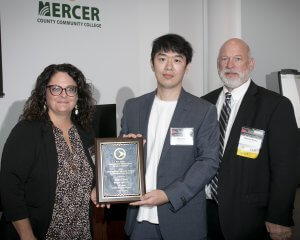
2022 Outstanding University Student in Transportation Research Award, Xiao Chen, Rutgers University, Innovative Pothole Repair Materials and Techniques. Photo by Steve Goodman.
At the 24th Annual NJDOT Research Showcase on Oct. 26th, Rutgers student Xiao Chen won the 2022 Outstanding University Student in Transportation Research Award for his work on the NJDOT project “Innovative Pothole Repair Materials and Techniques” led by Rutgers CAIT researcher Dr. Hao Wang.
Roadway pothole repairs are one of the most vital and frequent maintenance activities for transportation agencies—especially in regions such as the Northeast prone to freeze-thaw weather cycles.
Significant costs and resources are spent in pothole repair every year including the cost of new materials, labor, equipment, and traffic control. Failure to mitigate potholes can have costly consequences too.
For example, a 2021 survey from AAA found that 1 in 10 U.S. drivers sustained significant vehicle damage after hitting a pothole in the year prior—with an average price tag of nearly $600 per repair. In total, drivers paid $26.5 billion in pothole damages in 2021 alone.
An NJDOT project being led by Rutgers researchers, “Innovative Pothole Repair Materials and Techniques,” is identifying and evaluating innovative tools, technologies and materials to improve the cost, efficiency and safety of pothole repairs in New Jersey.
As part of the project, Xiao Chen, a Civil Engineering graduate student at Rutgers University, has developed a detailed pothole-repair procedure that applies an innovative pre-heating method using infrared technology to more evenly and efficiently heat the pavement material.
For his work and leadership on the project, Chen won the 2022 Outstanding Student in Transportation Award at the 24th Annual NJDOT Research Showcase this October.
He was nominated for the award by Dr. Hao Wang, an Associate Professor at Rutgers and researcher at the Center for Advanced Infrastructure and Transportation (CAIT).
Chen helped construct a test section with artificial potholes and temperature detection sensors at Rutgers to further test this new method in addition to bringing it out into the field. The data so far shows promising results in mechanical performance of repaired pavement when using infrared heating, as opposed to microwave heating and other more traditional methods.
Based on the test data, he also constructed a numerical model to analyze the effect of heating performance under different field conditions, which can be used to determine the optimal heating time for real-world practice.
Related to the project, Xiao has published a paper in Transportation Research Record titled “Evaluation of Microwave Heating for Potential Applications in Hot In-Place Recycling of Asphalt Pavement.” He will be presenting his research at Transportation Research Board (TRB) 102nd Annual Meeting this January during a session on Advancing Pavement Maintenance Technologies.
“Xiao is a very dedicated and adaptable student who has been a leader on this pothole repair project,” Dr. Wang said. “His efforts have led to the development and testing of an innovative pothole repair method that can have significant safety and economic impacts if implemented. This award recognized his hard work and contribution to the transportation research community here in New Jersey.”
The 24th Annual NJDOT Research Showcase provided an opportunity for the New Jersey transportation community to learn about the broad scope of academic research initiatives underway and share technology transfer activities being conducted by institutions of higher education partners and their associates.

